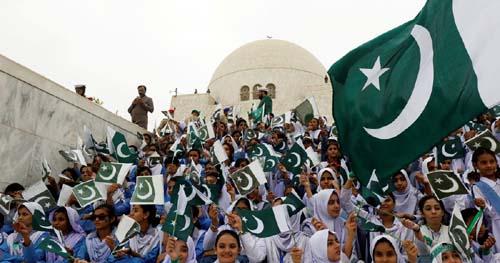
The road ahead
Ali Rehman Malik
In the course of every people’s history, they are faced with a choice. A choice that decides the fate of generations to follow, as it has within it, the potential to lay solid foundations upon which future generations can thrive or disintegrate, giving way to internal corrosion and corruption.
That choice is whether or not we can, on an individual level and a collective level, make the decision to focus on the actual causes of the troubles we face rather than merely spending our time fighting the symptoms. Like fighting phantasms, with no bearing on the actual solutions to the challenges we contend with. By cutting through to the root causes of the issues we seek to surmount, we give ourselves a fighting chance of dealing with natural, social, and global pressures, which would otherwise sweep over us, thereby preserving our culture and our identity.

A culture or a people’s legacy is dependent upon choices made in the present. In choices that we know will benefit our grandchildren, and their children. Or as the saying goes, “A society grows great when old men plant trees whose shade they know they shall never sit in.” When we only fight the symptoms of our troubles, bickering between ourselves, lost in identity politics, or grandstanding idealism (which can often do more harm than good) we face an uphill struggle with no real end in sight. No doubt it takes courage to face reality with honesty, however, the alternative of staying lost in our self-imposed ideological prisons, finding one internal enemy to fight after another, is not a viable long-term solution. In fact, it is a recipe for disaster as it compels us to turn a blind eye to the actual ‘first’ causes that require our attention and intelligence to resolve.
In times of strife, or great socioeconomic and cultural upheavals and conflict, various ideologies tend to emerge, often conflicting, in their nature rather than their general aim. Each smaller segment of society and its individuals have different ways of thinking, different upbringings, and cultural backgrounds. Sometimes those segments do not even inhabit the same world, to all intents and purposes. Because people tend to essentially have different ideals and different desired outcomes (even subtly) it’s natural that one’s idea of where society can be improved and how to go about doing it will differ between people.

The important thing for a society to move forward is that each conflicting ideology, has in the end, the aim to improve the lives of as many people as possible, even those that lie outside its own selected chosen few. In the age of social media and AI, with instantaneous communication and information sharing, this issue is even more pressing. There is a huge responsibility on each of our shoulders to think through our preferences and beliefs before we release them into the world. Ideas do not necessarily need to be true to gain traction, they simply have to find enough people on the other end that think in a similar fashion, to embrace the ideology for it to gain momentum. Pakistan finds itself in such precarious times now. As if dealing with a pandemic and its expected economic fallout (and the myriad of associated issues) was not enough, it was then faced with one of the worst natural disasters in history. A catastrophic deluge that left a third of the country submerged under water. Displacing thousands of people, destroying crops, and causing untold damage to infrastructure.
Outside of any party affiliations, I commend BBZs work as Foreign Minister. He has brought a sense of optimism and vitality to the foreign office and has been instrumental in helping the country secure much-needed foreign aid and support. Aid, however, is not all that is required due to the magnitude of the task ahead. We need to ensure that the global community is aware of how proposed climate targets will affect Pakistan, increasing the need for subsidies in order to remain sustainable. Not to mention the risk of further disasters caused by climate change. The country’s people are suffering as a result of a crisis they had very little part to play in.

By mid-January of this year, as many as 4 million children were still living near contaminated and stagnant flood waters, risking their survival and well-being. Frail, hungry, children, fighting a losing battle against severe acute malnutrition, diarrhoea, malaria, dengue fever, typhoid, and painful skin conditions. As well as physical ailments, the longer the crisis continues, the greater the risk to the children’s mental health. Furthermore, hundreds of thousands of homes and many public health facilities, water systems, and schools have been destroyed or damaged. This damage to basic infrastructure will have far-reaching consequences, which need to be addressed immediately to ensure not only the well-being of the people affected but also stability in the region.
With regards to stability in the region, the increasingly brutal and violent Taliban regime is going about ‘mediavalising’ Afghanistan. Snatching away the sense of fleeting hope its people finally felt after decades of strife and war. In just the last few months, in a cascading descent into fascism, the women of Afghanistan find themselves banned from attending schools and universities. Banned from running shops, banned from entering parks, and even banned from being seen by male doctors. Keeping in mind that women will no longer be able to receive an education, let alone pursue a career in medicine, they are effectively depriving half the population of seeking any medical treatment, as there will be no female doctors.
What’s more, an entire generation of Afghani boys and girls will now be raised by uneducated women, living solely at the pleasure of their guardians. Factor in the unavoidable economic collapse (there are already widespread food shortages) and we are once again headed for an angry, dejected society, full of misdirected anger and resentment. Leaving the young men and women rife for indoctrination. It may seem like deja vu, but we need to realise that there are other more insidious movements and factions lying in wait in the shadows. Monsters like Daesh, looking for a chance to usurp the Taliban and further complicate issues. And sadly, as we all know too well, these issues have a direct effect on the terror threat in Pakistan, which the country has quietly suffered for decades.
Finally, the economic fallout which is still evolving means the Pak rupee has hit record lows, leaving the country in a particularly difficult situation. Dependence on energy imports has left the country vulnerable to price shocks, leading to large inflationary pressures, low USD reserves, and the possibility of social instability, in addition to a multitude of economic issues which will require very careful management in the coming months and years to ensure recovery. Even once we have dealt with these calamities, the work is not yet done. We are then faced with the huge task of improving our society and bringing basic necessities to people from all walks of life. Laying the seeds of the country’s future by funding education. To tap into one of Pakistan’s largest resources, its population. Attracting foreign investment, by providing a stable environment, and adhering to the rule of law, for companies to feel confident doing business in Pakistan. By moving forward with foresight and wisdom, not with reactivity and ad hoc decision-making.
The country has huge potential and the writer hopes that in dealing with these troubling times the country can unite in its troubles and come out stronger. Come out with the aim of building a society where the highest goal of the common man is not to merely survive, but rather to thrive.
This article is reproduced
